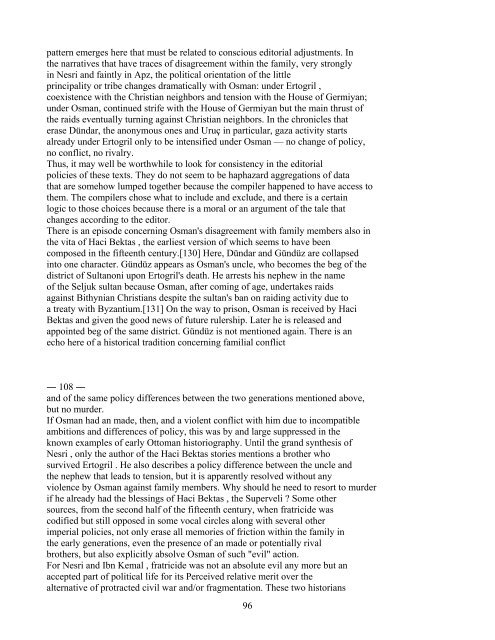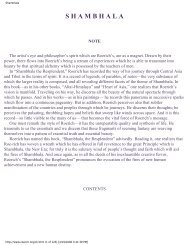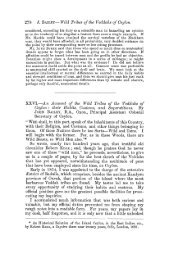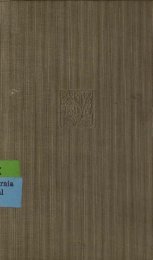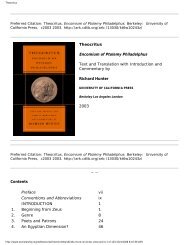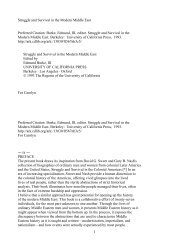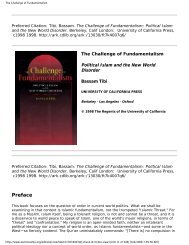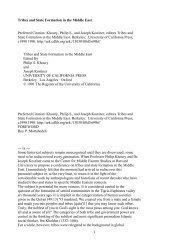Between Two Worlds Kafadar.pdf
Between Two Worlds Kafadar.pdf
Between Two Worlds Kafadar.pdf
You also want an ePaper? Increase the reach of your titles
YUMPU automatically turns print PDFs into web optimized ePapers that Google loves.
pattern emerges here that must be related to conscious editorial adjustments. In<br />
the narratives that have traces of disagreement within the family, very strongly<br />
in Nesri and faintly in Apz, the political orientation of the little<br />
principality or tribe changes dramatically with Osman: under Ertogril ,<br />
coexistence with the Christian neighbors and tension with the House of Germiyan;<br />
under Osman, continued strife with the House of Germiyan but the main thrust of<br />
the raids eventually turning against Christian neighbors. In the chronicles that<br />
erase Dündar, the anonymous ones and Uruç in particular, gaza activity starts<br />
already under Ertogril only to be intensified under Osman — no change of policy,<br />
no conflict, no rivalry.<br />
Thus, it may well be worthwhile to look for consistency in the editorial<br />
policies of these texts. They do not seem to be haphazard aggregations of data<br />
that are somehow lumped together because the compiler happened to have access to<br />
them. The compilers chose what to include and exclude, and there is a certain<br />
logic to those choices because there is a moral or an argument of the tale that<br />
changes according to the editor.<br />
There is an episode concerning Osman's disagreement with family members also in<br />
the vita of Haci Bektas , the earliest version of which seems to have been<br />
composed in the fifteenth century.[130] Here, Dündar and Gündüz are collapsed<br />
into one character. Gündüz appears as Osman's uncle, who becomes the beg of the<br />
district of Sultanoni upon Ertogril's death. He arrests his nephew in the name<br />
of the Seljuk sultan because Osman, after coming of age, undertakes raids<br />
against Bithynian Christians despite the sultan's ban on raiding activity due to<br />
a treaty with Byzantium.[131] On the way to prison, Osman is received by Haci<br />
Bektas and given the good news of future rulership. Later he is released and<br />
appointed beg of the same district. Gündüz is not mentioned again. There is an<br />
echo here of a historical tradition concerning familial conflict<br />
― 108 ―<br />
and of the same policy differences between the two generations mentioned above,<br />
but no murder.<br />
If Osman had an made, then, and a violent conflict with him due to incompatible<br />
ambitions and differences of policy, this was by and large suppressed in the<br />
known examples of early Ottoman historiography. Until the grand synthesis of<br />
Nesri , only the author of the Haci Bektas stories mentions a brother who<br />
survived Ertogril . He also describes a policy difference between the uncle and<br />
the nephew that leads to tension, but it is apparently resolved without any<br />
violence by Osman against family members. Why should he need to resort to murder<br />
if he already had the blessings of Haci Bektas , the Superveli ? Some other<br />
sources, from the second half of the fifteenth century, when fratricide was<br />
codified but still opposed in some vocal circles along with several other<br />
imperial policies, not only erase all memories of friction within the family in<br />
the early generations, even the presence of an made or potentially rival<br />
brothers, but also explicitly absolve Osman of such "evil" action.<br />
For Nesri and Ibn Kemal , fratricide was not an absolute evil any more but an<br />
accepted part of political life for its Perceived relative merit over the<br />
alternative of protracted civil war and/or fragmentation. These two historians<br />
96


